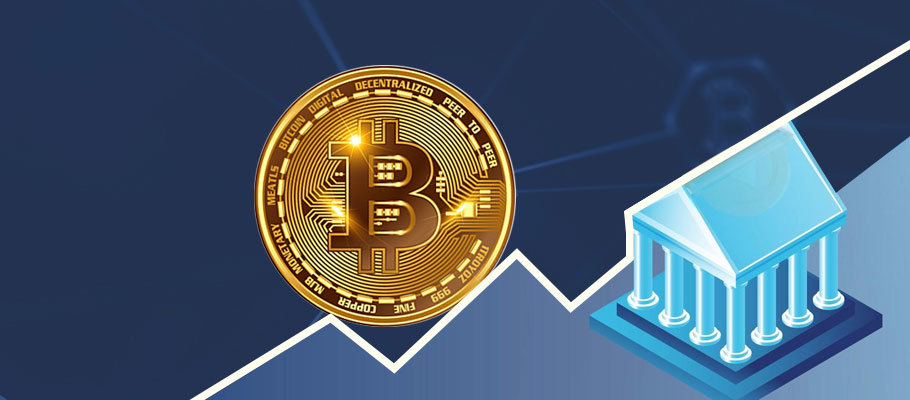
Published: February 2nd, 2022
Analysts at Wall Street stalwart JP Morgan now believe that Bitcoin will struggle to win over new institutional investors due to its volatility. Meanwhile, number two crypto Ethereum can expect to face stiff competition from blockchain rivals like Solana this year.
In a note to investors, Morgan analysts said they saw 'notable challenges' in the coming months for cryptos two biggest coins by market cap.
Bitcoin's volatility makes it five times more prone to price swings than gold, and the raft of competitors lining up to take a chunk out of Ethereum's market share means its steady rise could be halted or even reversed.
On a more positive note, the market missive also said that the current crypto price slide looks 'less dire than the plunge seen in May 2021,' when prices crashed the combined crypto market cap by billions in a single week.
'It's our view that Bitcoin's most significant challenge going forward is its inherent volatility and the cycles of boom & bust cycles that make extended institutional adoption less likely.
The note says that BTC, which is down 43 per cent from the all-time high of USD 69,000 reached in November 2021, was also more volatile than gold by a factor of five. That belies the claims of many cryptocurrency commentators who frequently refer to BTC as 'digital gold,' offering hedge protection against inflation similar to what the yellow metal has traditionally provided to investors.
Morgan analysts said that Ethereum’s rivals in the decentralized finance (DeFi) space, such as Binance Smart Chain and Solana, would also make life difficult for ETH investors.
DeFi applications aim to automate much of what traditional banks do to verify and manage transactions between counterparties by using blockchain networks. DeFi apps were initially built mainly on Ethereum’s, but they've become victims of their own success. The surge in transactions and activity has made Ethereum's network expensive and slow to use. New networks have emerged to take advantage of Ethereum's technical weaknesses, and JP Morgan says they are succeeding.
‘We were surprised that Ethereum has not managed to re-capture market share during this month’s correction,’ said Morgan’s analyst note. 'The price of ETH price has sunk almost in tandem with smaller altcoins.’
Ethereum should also have been in pole position to benefit from the ongoing explosion in non-fungible token (NFT) demand, Morgan added. NFTs are tokens that offer a unique digital representation of works of art and music that can be traded like financial assets. Initially, they were created using Ethereum's network, but more recently, new blockchains like Solana have been able to attract more NFT creators.
Rivals like Solana offer faster and less costly transactions than Ethereum's, a significant benefit since NFT transactions are sharply on the rise, inflated by celebrity endorsements and surging market interest. Solana, however, still has technical bugs to work out. Network congestion and slowdowns are common, and it can suffer extended outages. In September 2021, its network went dark for 16 hours hours.
Market interest in SOL, Solana's native coin, is still buoyant. It's just above USD 100 at the time of writing, sustaining its position as the seventh-biggest crypto asset by market cap.
Two reports released in September of 2021 captured a steady rise in the level of interest crypto had garnered from traditional investors.
A survey by Nickel Digital Asset Management in London found that more than 80 per cent of wealth managers, institutions, and hedge fund executives with current crypto exposure planned to grow their digital asset holdings in 2022.
Forty per cent indicated plans to increase their crypto positions, and only eight per cent said they planned to walk back their digital asset investments.
The majority, however, had relatively low levels of crypto-asset exposure, indicating some were testing to market or attempting to learn how it operates.
More than half said they were looking at crypto assets as a source of long-term capital growth. Nearly 40 per cent said that the practical experience of trading crypto strengthened their confidence in the asset class. Another 35 per cent said steady encouragement from other investors and fund managers spurred them to invest further.
In a summary report, Nickel said that broad market confidence in the cryptocurrency asset class is rising.
‘Our research points at least 19 publicly traded companies worth a combined USD one trillion have invested nearly 6.5 billion dollars in BTC alone.’
Data from JP Morgan's own research found that even traditional investment firms with no experience in cryptocurrencies were expected to hold crypto on their books in 2022.
A survey of more than 3,500 investors found that just ten per cent of those polled worked for firms that invested or traded in digital assets. However, more than double that proportion indicated readiness to invest in Bitcoin and potentially others, suggesting that old money was set to keep flowing into crypto markets.
Of the companies that didn't have crypto positions in 2021, 20 per cent said they thought their firms would dip a toe into crypto markets 'very soon.
At the time, several market watchers said that sustained institutional buying would be needed if the price of bitcoin was going to keep rising. However, many traditional investors were still voicing concerns about the crypto market's numerous unknowns.
Asked if they were for or against crypto as an asset class, 14 per cent said that it was too volatile, while 22 per cent thought crypto rising popularity was ‘just a blip’. Only seven per cent of respondents agreed with the statement ‘crypto is set to become one of the most vital instruments.’
Security topped the list of investor worries, with 93 per cent saying they thought hacking and cyber-fraud were unavoidable in crypto markets.